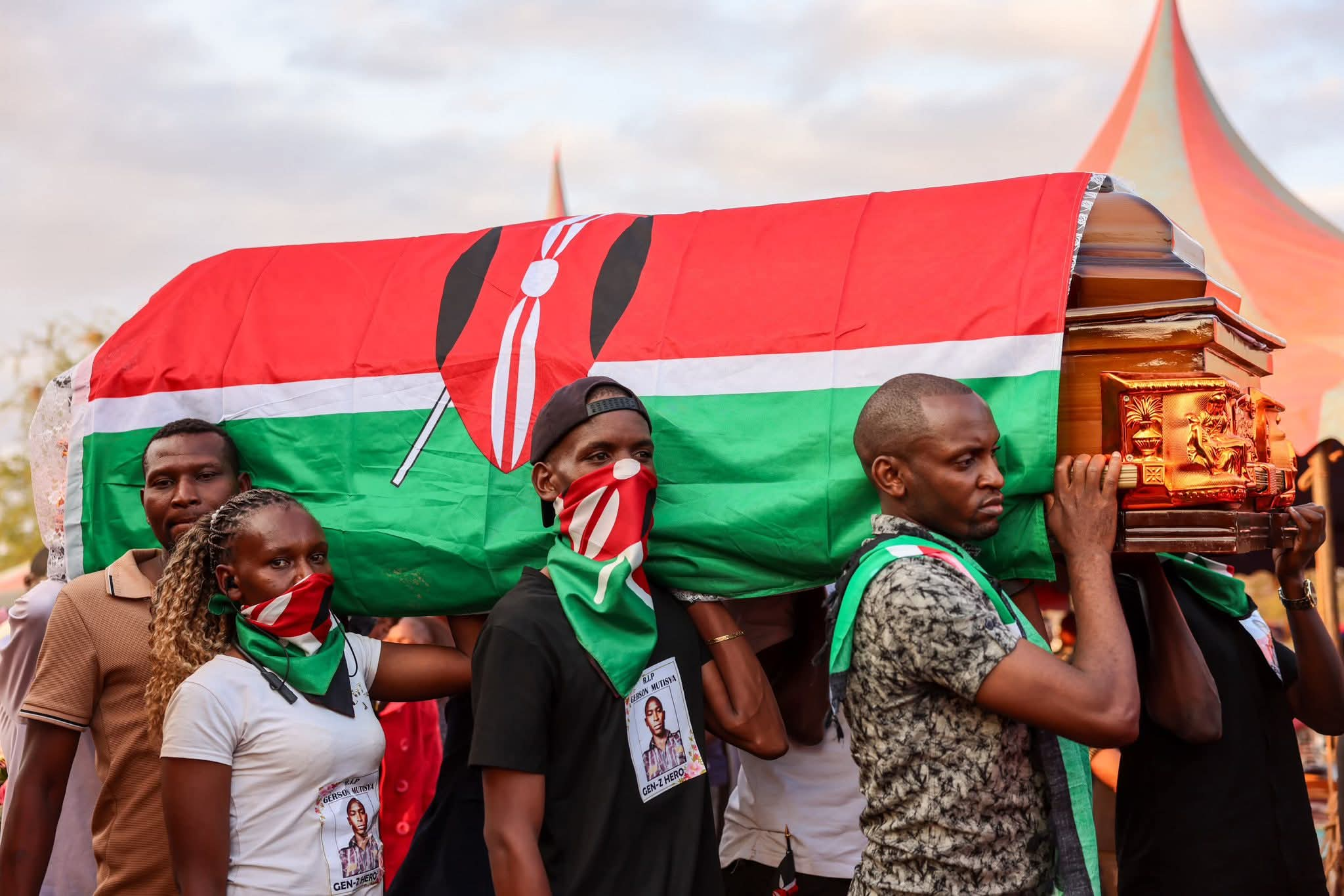 Gen Z youth carry to the grave the Casket bearing the body of Garshon Mutisya who was fatally shot by police during the nationwide Gen Z protests on June 25. Photo Andrew Mbuva
Gen Z youth carry to the grave the Casket bearing the body of Garshon Mutisya who was fatally shot by police during the nationwide Gen Z protests on June 25. Photo Andrew Mbuva
By Andrew Mbuva
A somber cloud of grief and fury engulfed Makutano village on the outskirts of Emali town as mourners gathered for the burial of Garshon Mutisya, the 31-year-old man who was fatally shot by police during the nationwide Gen Z protests on June 25.
Tears flowed freely, and tempers flared as leaders and youth alike used the emotional sendoff to condemn what they termed the state-sanctioned killing of innocent demonstrators.
Garshon’s devastated mother broke down during the ceremony, mourning her only son whose life was cut short by a police bullet. His family, still grappling with the shock, expressed deep frustration over what they see as systemic neglect and a failure to deliver justice.
“We feel abandoned. If local leaders had come out strongly to condemn this killing, maybe someone would have been arrested by now,” said Robinson Musyoki, Garshon’s brother.
The funeral turned into a rallying point for members of the Gen Z movement, who maintained a firm stance against calls for dialogue that they say ignore the real issues affecting Kenyan youth.
“There will be no dialogue with a regime that tells police to shoot us,” declared Kyalo Mutisya, a Gen Z representative. “We asked for a conversation on X, and nothing was done. Now we are urging every youth to register as voters — that’s how we remove tyrants.”
Their outrage was directed squarely at President William Ruto’s controversial directive urging police to shoot protesters in the leg — a statement that continues to ignite condemnation across the country.
“It’s shameful that the President would even utter such words,” said Joshua Okaya, another youth. “Parents must not forget that someone in power told police to shoot their children. We won’t let that go unchallenged.”
“We are the same youth who voted this government into power,” added John Kioko. “We were good enough when you wanted votes — respect our rights now.”
Several leaders present at the burial issued sharp rebukes to the government, accusing it of turning a deaf ear to the voices of the youth and responding to peaceful protests with brutality and bloodshed.
“This is not about tribal power deals or prime minister posts,” said Makueni Governor Mutula Kilonzo Jr. “The only meaningful dialogue must be centered on justice. Those who gave orders to shoot and those who pulled the trigger must be held accountable under the law.”
Former Makueni Governor Prof. Kivutha Kibwana minced no words, calling the killings of protesters a form of state-sponsored assassination.
“These young people were not killed by mistake — they were assassinated. And the President must be reminded that he was not elected to murder citizens pushing for their constitutional rights.”
Makueni Senator Daniel Maanzo also echoed the call for accountability, warning the government against valuing political theatrics over human life.
“Our rights are more important than the handouts you are parading in the name of empowerment. The presidential sword is meant to protect citizens — not slaughter them.”
As Garshon’s body was lowered into the grave, amidst chants of “Justice for Garshon!”, a renewed resolve swept through the mourners.
For the family and the Gen Z movement, the message was clear — this is not the end, but the beginning of a louder, more unrelenting pursuit of justice.